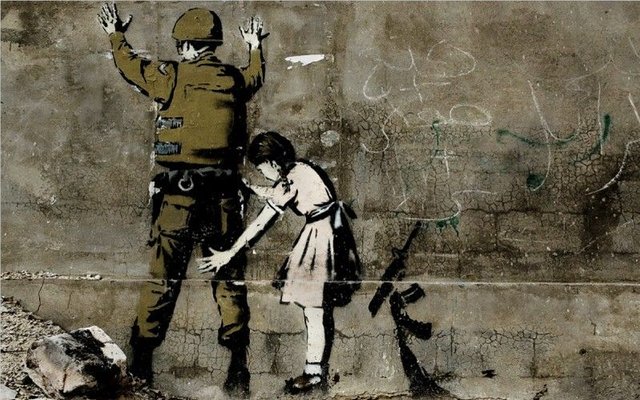Why Israel is wrong about the West Bank
Your Weekly Talking Point

Why Israel is wrong about the West Bank
The conflict between Israel and Palestine is one of the most complicated in international politics and as you’ll probably know by now, one of the most controversial political situations we can find in the entire world. In order to make it easier, we’re going to tackle the very delicate issue of the Israeli settlements in the West Bank, this is a pretty major issue as almost all these settlements are in serious violation of international law.
In the last 40 years, even all the administrations of the United States have taken a position against Israel. And I’m not talking about governments like Jimmy Carter here I’m talking about Ronald Reagan who himself demanded the immediate freeze of any new settlements as he claimed they were an evident obstacle to peace. George H Bush threatened to take disciplinary measures of an economic nature, then Bill Clinton proposed a law to punish Israel by reducing American assistance. Even today Trump’s administration has asked Israel to stop being such a pain in the arse about it.
So, what do you think Israel has done in the face of all this criticism? Well they basically ignored it and have kept expanding their settlements. But wait, what are these settlements and what do they really mean?
Well let’s have a look at that, the first thing we need to know is that according to agreements that have been reached, the territory or state of Palestine is formed by what is today called as the “West Bank” and the “Gaza Strip”. These territories correspond to the political map prior to the 6-day war after which Israel occupied these territories which used to belong to Jordan. So, the settlements are essentially communities, villages, towns & cities that Israel has been building since 1970 in the west bank…territory of the future Palestinian state.
And it is not just a few houses we’re talking about here; the west bank is a small territory with early 5,600 km2 which is about the size of the state of Delaware. But even so (not considering east Jerusalem) there are 131 settlements and an additional 97 outposts. These outposts are settlements as well, but in these cases, they are illegal even un Israeli law. These outposts were built without the consent of the Israeli government.

That means that there are more than Israeli 228 settlements around the West Bank. Many are places of relevant value like Aquifers which makes it more complicated because roads and infrastructure need to be set up to connect them. Besides Israel needs to protect these settlements and that involves police patrolling around the West Bank which affects the mobility of Palestinians and makes economic development even more difficult.
And the problem isn’t just the existence of these settlements, it’s that they don’t stop growing. Last year, more than 2,000 new buildings had started to be constructed and there are plans to build 3,000 more in 2018 alone, obviously in addition to this there are also medical centres, schools, synagogues ..etc.
So what’s the result of all of this?
Take a look at this chart to see how the population has evolved.

So now you might be asking, well what’s the problem here?
Those who are pro-settlement claim that these population centres are growing where there used to be nothing. Consider what the mayor of Ma’ale Adumin says about one of the main settlements:
“We didn’t steal the land from anybody, it was built, on empty hills, you can see there the desert, rocks and sand. Now you have a living city” - Benny Kashroiel
Ma’ale Adumin is a city of 40,000 inhabitants with schools, theatres, library, industrial centre. According to the residents there it’s a complete city, so again what’s the problem exactly?
The problem is that in order to solve the Israel Palestine conflict, all parties agree that two states are necessary: One being Israel & the other being Palestine. But with all the settlements Palestinian sovereignty in the West Bank will be in serious danger because Israel has already said they will never give up sovereignty over these places and that includes the road, infrastructures, security controls...
Palestine will be unable to become an effective and autonomous state with such limitation especially considering the settlements won’t stop growing. So now we get why this topic makes everyone so tense.
The tension over Netanyahu’s settlement policy hasn’t stopped growing since 2015, the situation has reached a point that on the 23rd of December 2016 the UN security council asked resolution 2334 that strongly condemns the Israeli settlement policy.
This resolution could be passed because for the first time the US didn’t use their right to VETO the resolution. This is something that made Netanyahu’s government fuming mad. The Prime Minister didn’t hesitate to describe the situation as “Absurd” even accusing Barack Obama’s administration in public of trying to carry out a “shameful anti-Israel manoeuvre”. So yeah, he was pretty angry.
But this resolution shouldn’t have taken Netanyahu by surprise given some of the decisions he announced in 2016 and confirmed in 2017.
The Israelis have started a new settlement in the West Bank which is the first for two decades. So, Israel has not only encouraged the existing settlements, but they’ve even started a new one. On the other hand, (maybe empowered by the alleged good relations with Trump) the parliament in Israel, after lots of controversy finally passed a new law at the beginning of 2017. This law legalises around 4,000 houses built on Palestinian private property, houses that the Israeli supreme court has even ordered to be dismantled.
And hey as we said, the fact that Trump might look closer to Israel might mean that his administration isn’t also tired of this settlement issue, that is why in order to regain trump’s favour, Jerusalem has committed to starting a new policy that seems to slow down the growth of existing settlements and forbid outposts completely. But the new policy is so cryptic and complex that it seems very likely the settlements will just keep growing.
Another question, why did these settlements grow so much? Well pay close attention here.

Think about it: Why do so many Israelis want to live in these conflict zones? Is it because maybe there are some valuable natural resources to be exploited? Well, not really. The explanation is … much less creative. The government of Israel is subsiding the establishment of these settlements. The government in Israel co-finances the construction of these houses creating discounts of almost 70% of the price of land and offers a great deal of financial aid. And the result is? Houses are 40% cheaper than in the formal territory of Israel.
And that’s not all, the government of Israel also ensures security and provides all kinds of public services. So, as you can imagine the youth and many families see these as places where they can have a better life than they could in Israel’s formal territory. So now the question becomes. How does Israel benefit from this?
The truth is they really don’t and in exchange they get just a bunch of political and economic problems. These settlements aren’t just an obstacle for the peace process and foreign policy they are also a big waste of public money. So look with the subsides, security, expensive public services .. The Peace Now Foundation and the ADVA centre (both Israeli) estimate the cost of these establishments is more than a billion dollars a year.
In other words, this is nothing but an expensive policy both for the citizens of Palestine as well as those of Israel.
Let’s be absolutely clear, Israel is a country full of positive things. Unlike their neighbouring countries, Israel is a consolidated democracy with strong civil liberties with a prosperous innovative economy. Many of the products and services we use everyday wouldn’t exist if it weren’t for the technology developed in Israel and don’t be fooled. Putting an end to the settlements wouldn’t mean an end to the conflict because there is a precedence.
In 2005, Israel left the Gaza strip completely, stopping all the settlements and removing all civilians and soldiers. And the result was neither peace nor prosperity. The strip is now controlled by Hamas radicals and it is even in conflict with the government of Palestine itself and the situation isn’t good from a humanitarian perspective either. But it definitely doesn’t justify the settlement policy of Israel and their lack of commitment towards a peace agreement.
And so now the question is. Is there really any possible solution to this conflict? More and more experts claim the solution needs to be a bottom up strategy. Encourage economic development in the West Bank, establish a dialogue and understanding where trade relations between Israelis and Palestinians are normal, and let the national authorities in Palestine have more jurisdiction.
These all require time but more than that, it requires commitment
